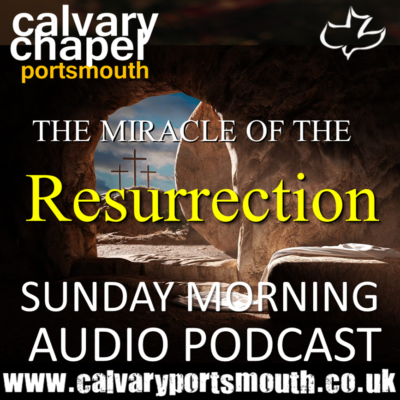This teaching on the Miracle of the Resurrection was given by pastor Barry Forder on Resurrection Sunday, 17th April 2022.
The PowerPoint slides used in this teaching are available for free download.
Edmund Spencer once said: “There is a principle which is a bar against all information, which is proof against all argument, and which cannot fail to keep man in everlasting ignorance. That principle is condemnation before investigation”.
To reject something because you’ve investigated it and found it to be nonsense is just common sense! Who in their right mind wants to knowingly believe fables? But to reject something – in this case a presentation of evidence for the Resurrection of Jesus Christ – simply because of prejudice, i.e., you don’t think it’s true, or worse still, you don’t want to believe it’s true, is foolish.
But why does it matter? Well, quite simply, if the Resurrection can be shown to be an historical event, it provides a formal proof for Jesus’ Deity and God’s existence, one that is tangible, one that anyone can verify for themselves; and if God can be shown to be real, then it follows that the Bible and all therein, about life, death, sin, judgment, salvation, eternity – is true. It means every life is of value, there is a purpose and reason for our existence. It means we are not just meaningless blobs of matter in a pointless and random universe; and it means this life is not the end. Eternity no longer remains a concept for those who “have faith”, but a reality we all have to face. Ultimately, if the Resurrection can be shown to be a true fact of history, it means we all have to make a choice; and that choice becomes the single most important one of our lives.
The famous British mathematician and author, C.S. Lewis once said: “Christianity is a statement which, if false, is of no importance, and if true, is of infinite importance. The one thing it cannot be is moderately important”.
Paul contends that the very basis for the Christian faith is firmly rooted in an historical event that occurred in a garden in Judea some 2000 years ago, namely, the Resurrection of Jesus Christ from the dead. If that event did not take place, Paul says we might as well just pack up and go home! There is no point just believing this thing ‘cos it gives us a warm fuzzy feeling. It is either true, and we can substantiate it, or it’s false and we should just get on with our lives and stop being so silly.
What Paul actually said was: “But if there be no resurrection of the dead, then is Christ not risen: And if Christ be not risen, then is our preaching vain, and your faith is also vain… And if Christ be not raised, your faith is vain; ye are yet in your sins… If in this life only we have hope in Christ, we are of all men most miserable.” (1 Cor 15:13-19)
Did you get that? Paul says that if you (or your sceptic friend) want to disprove Christianity, simply show that the Resurrection did not take place; show that it was all a hoax or some elaborate plot. Paul was that confident in the historical and factual basis of the Resurrection and knew that without it, there could be no Christianity, because everything Christians believe hangs on that one event.
Christian apologist and international speaker Josh McDowell said: “Everything that Jesus Christ taught, lived and died for depended upon His resurrection” [i]
B. L. Shelley, in his thorough treatment of the history of the Christian church stated: “First Corinthians fixes belief in the historical resurrection of Jesus as the indispensable basis of salvation” [ii]
Quoting Theodosus Harnack, Josh McDowell again states: “Where you stand with regard to the fact of the Resurrection is, in my eyes, no longer Christian theology. To me Christianity stands of falls with the Resurrection”[iii]
Contrary to most people’s perception, Christianity is not based on Christ’s teaching, character, or the numerous miracles in His life, but on the simple undisputed fact (in the minds of His followers) of his Resurrection.
In this study we consider just some of the circumstantial evidence for the Resurrection.
J Warner Wallace, a former cold case detective and author of Cold Case Christianity poses the question: “Can the truth be proved beyond a reasonable doubt when all the evidence we have is circumstantial?”
His answer, based on decades of experience, “Absolutely!”
There is overwhelming evidence for the Resurrection of Jesus Christ, but just the circumstantial evidence alone is sufficient to convince any honest and open minded jury that Jesus Christ did rise from the dead as He said He would do.
May you be blessed and encouraged by this study.
[i] Josh McDowell – Evidence That Demands a Verdict
[ii] B. L. Shelley, Church history in plain language.
[iii] Theodosus Harnack: quoted by Josh McDowell, Evidence That Demands a Verdict


